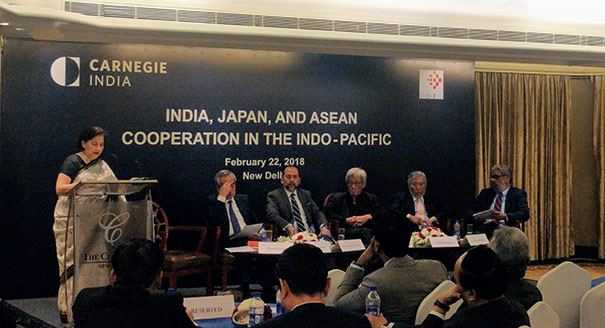Registration
You will receive an email confirming your registration.
The Indo-Pacific has emerged as a critical region in global politics. The stakes for India and Japan are rapidly rising in this theater and the Association of Southeast Asian Nations (ASEAN) sits at the heart of it. Comprehensive cooperation between India, Japan, and ASEAN can help realize peace and prosperity in the Indo-Pacific.
Carnegie India, in partnership with the India Development Foundation, hosted a panel discussion to assess opportunities and challenges for cooperation among India, Japan, and ASEAN in the Indo-Pacific region.
Discussion Highlights
- The Idea of the Indo-Pacific: Participants discussed the evolving concept of the Indo-Pacific. They stated that the current flux in great-power relations and a historic power shift in Asia is compelling states to rethink their strategic geography, reimagine their national policies, strengthen regional institutions, and reinforce a rules-based order in Asia.
- Toward Greater Convergence: All participants agreed on the important roles played by India and Japan in shaping the Indo-Pacific region. They described how the convergence between India’s ‘Act East’ policy and Japan’s ‘Free and Open Indo-Pacific’ strategies has helped both nations align their policies on security cooperation, connectivity, and promoting dialogues between experts from both nations. Participants stated that at the bilateral level, ASEAN has good relations with both India and Japan. The presence of the ASEAN leaders at the 2018 Indian Republic Day celebration highlighted the importance of India-ASEAN relations, they added, while ASEAN and Japan share historic ties and a strong political and security relationship. Participants highlighted the need to focus more on multilateral organizations like the East Asia Forum or track 1.5 and track 2 forums to promote greater collaboration between India, Japan, and ASEAN nations.
- Enhancing Regional Connectivity and Integration: Participants stated that connectivity in the region is a crucial tool for spreading prosperity in South Asia and Southeast Asia, and that Japan and India are key partners in promoting infrastructure development. Both nations are involved on multiple projects that aim at creating corridors through India and ASEAN, such as the Thailand-Myanmar-India highway and the Bay of Bengal Industrial Growth Belt. Participants also highlighted that, given its potential, digital connectivity needs to be explored further. India and Japan are hubs of technology and ASEAN can greatly benefit from shared collaborations with both nations, they said. All participants agreed that there was great scope for nations to work together to expand digital connectivity in the region.
- ASEAN’s Centrality: Participants stated that ASEAN unity is one of the core pillars of maintaining a secure and stable Indo-Pacific region. As a successful multilateral forum, ASEAN has been committed to maintaining peace, stability, freedom of navigation, and the peaceful resolution of disputes, they noted. They also highlighted that by promoting and consolidating the rule of law, economic prosperity, peace, and stability, ASEAN’s principles have contributed to the continued development of the region.
- Maritime Security Cooperation: Participants stated that maritime security cooperation is a key area for collaboration between India, Japan, and ASEAN. India and Japan both view themselves as maritime nations and participate in a series of joint exercises, they noted, and ASEAN nations are also focused on strengthening their maritime capabilities. Participants emphasized the need for more maritime information sharing and maritime domain awareness. Moving forward, panelists stated, the signing of white shipping agreements is important for all nations. They recommended deeper collaboration to address nontraditional challenges such as climate change, piracy, illegal fishing, and smuggling.
This event summary was prepared by Rhea Menon, an intern at Carnegie India.
Agenda
6:00 p.m.
Registration
6:30 p.m.
Welcoming Remarks
C. Raja Mohan
6:40 p.m.
Keynote Address
Preeti Saran
6:55 p.m.
Panel Discussion
Preeti Saran, Kenji Hiramatsu, Sidharto Reza Suryodipuro, Lim Thuan Kuan, Yoshiji Nogami
Moderated by C. Raja Mohan
7:35 p.m.
Q&A
8:00 p.m.
Dinner
Speakers
Preeti Saran
Preeti Saran is secretary (east) in the Indian Ministry of External Affairs.
Kenji Hiramatsu
Kenji Hiramatsu is the current Japanese ambassador to India.
Sidharto Reza Suryodipuro
Sidharto Reza Suryodipuro is the current Indonesian ambassador to India.
Lim Thuan Kuan
Lim Thuan Kuan is the current Singaporean high commissioner to India.
Yoshiji Nogami
Yoshiji Nogami is the president of the Japan Institute of International Affairs.
Moderator
C. Raja Mohan
C. Raja Mohan is the director of Carnegie India.
